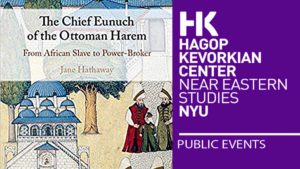Hathaway highlights the origins of the institution and how the role of eunuchs developed in East Africa as well as exploring the Chief Eunuchs connections to Egypt and Medina. By tracing the evolution of the office, we see how the Chief Eunuch’s functions changed in response to transformations in Ottoman society, from the generalized crisis of the seventeenth century to the westernizing reforms of the nineteenth century.
Jane Hathaway (Arts & Sciences Distinguished Professor of History, Ohio State University) is a specialist of the Ottoman empire. Her research has focused on the empire’s Arab provinces, particularly Egypt and Yemen. She has recently been working on the Chief Eunuch of the Ottoman Imperial Harem. She received her Ph.D. from Princeton’s’ Near Eastern Studies Department in 1992. She is the author of The Politics of Household in Ottoman Egypt: The Rise of the Qazdaglis (Cambridge, 1997), A Tale of Two Factions: Myth, Memory, and Identity in Ottoman Egypt and Yemen(SUNY Press, 2003), Beshir Agha, Chief Eunuch of the Ottoman Harem (Oneworld, 2006), The Arab Lands under Ottoman Rule, 1516-1800 (Pearson/Longman, 2008), and The Chief Eunuch of the Ottoman Harem: From African Slave to Power-Broker (Cambridge, 2018).
This book talk will also feature discussant Leslie Peirce (Emeritus, NYU), whose writing and teaching focus on the Ottoman empire, with an emphasis on the early modern period. Her first book explored the shifting nature of imperial politics by placing the palace harem at the center of inquiry. Other topics Peirce has written about include honor and sexuality, provincial politics, abduction and captivity, and slavery and household formation. She recently published a biographical account of Hurrem, the concubine and then wife to Suleyman I the Magnificent.
Check out the Facebook event here.
This event is co-sponsored by Ottoman & Turkish Studies (OTS) at NYU.



